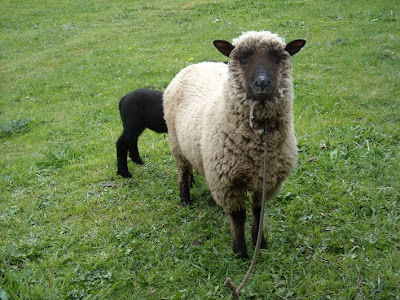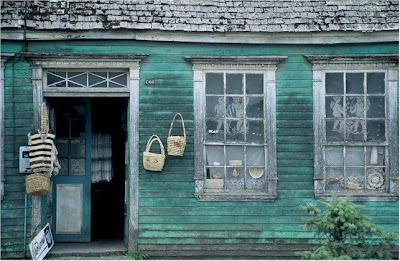 Wooden architecture has developed in Chiloé along two distinct lines. The first is associated with Spanish settlers of the 16th century. Though there are no documents of the period some have survived from the 18th century and aid our understanding of earlier periods. The second line of development is that brought by German colonists of the mid 19th century.
Wooden architecture has developed in Chiloé along two distinct lines. The first is associated with Spanish settlers of the 16th century. Though there are no documents of the period some have survived from the 18th century and aid our understanding of earlier periods. The second line of development is that brought by German colonists of the mid 19th century. These two strong heritages have been fused to the enrichment of both. As a result the architecture is vernacular in character and gives expression to the culture of the islands and personality of the builder.
These two strong heritages have been fused to the enrichment of both. As a result the architecture is vernacular in character and gives expression to the culture of the islands and personality of the builder. "Palafitos", (picture above), The buildings are raised on poles in the water. Though it is not original to Chiloé the style has been adopted in Ancud, Quemchi, Castro, Chonchi and other ports. Their construction was stimulated by the large amount of waterborne traffic in the 19th century. Only a few remain today, primarily in Castro.
"Palafitos", (picture above), The buildings are raised on poles in the water. Though it is not original to Chiloé the style has been adopted in Ancud, Quemchi, Castro, Chonchi and other ports. Their construction was stimulated by the large amount of waterborne traffic in the 19th century. Only a few remain today, primarily in Castro.


The style developed local characteristics, especially at the front where the living space was extended with balconies and characteristic window forms. With their shingled exteriors the Palafitos have a delightful appearance which has been strongly influenced by the traditional textile designs known to Chilote craftsmen. 

 The structural form of Chilote churches and chapels is very simple. Despite common bonds there is also a rich diversity of facades,
The structural form of Chilote churches and chapels is very simple. Despite common bonds there is also a rich diversity of facades,





 "Tejuela", (Shingle construction), Shingles were rarely used in the colonial period, they came into fashion with the arrival of German settlers in the areas of Llanquihue and Puerto Montt, who used them to give grace and elegance to their constructions. The shingles are cut from the timber of the alerce and are thin, wide and long, they are lapped one over another to prevent the ingress of rain leaving only a third of their length in view. The overall effect depends upon the shapes into which the shingles have been cut. Original dimensions were 90 cm long, 15 cm wide and 1 cm thick nowadays they are a little smaller.
"Tejuela", (Shingle construction), Shingles were rarely used in the colonial period, they came into fashion with the arrival of German settlers in the areas of Llanquihue and Puerto Montt, who used them to give grace and elegance to their constructions. The shingles are cut from the timber of the alerce and are thin, wide and long, they are lapped one over another to prevent the ingress of rain leaving only a third of their length in view. The overall effect depends upon the shapes into which the shingles have been cut. Original dimensions were 90 cm long, 15 cm wide and 1 cm thick nowadays they are a little smaller.







 Records from 1770 show that the houses of Castro, Chacao and the countryside all were built of weatherboard with thatched roofs (though a few were roofed with board). Thatched roofs, providing good insulation and protection from the weather, were part of the Mapuche culture. It is still possible to see a few examples in the islands of Quinchao and Lemuy.
Records from 1770 show that the houses of Castro, Chacao and the countryside all were built of weatherboard with thatched roofs (though a few were roofed with board). Thatched roofs, providing good insulation and protection from the weather, were part of the Mapuche culture. It is still possible to see a few examples in the islands of Quinchao and Lemuy.



 100% natural ...100% quality products...Chiloes Wool...
100% natural ...100% quality products...Chiloes Wool... Chiloe is well known for the many wool items it has. From scarves to sweaters, the wool is simply amazing. Quite warm and colorful. You can't leave Chiloe without buying some "chilote" sweater or one tipical Poncho.... You won't regret it on cold days.
Chiloe is well known for the many wool items it has. From scarves to sweaters, the wool is simply amazing. Quite warm and colorful. You can't leave Chiloe without buying some "chilote" sweater or one tipical Poncho.... You won't regret it on cold days.


 The structural form of Chilote churches and chapels is very simple. Despite common bonds there is also a rich diversity of facades,
The structural form of Chilote churches and chapels is very simple. Despite common bonds there is also a rich diversity of facades,





 "Tejuela", (Shingle construction), Shingles were rarely used in the colonial period, they came into fashion with the arrival of German settlers in the areas of Llanquihue and Puerto Montt, who used them to give grace and elegance to their constructions. The shingles are cut from the timber of the alerce and are thin, wide and long, they are lapped one over another to prevent the ingress of rain leaving only a third of their length in view. The overall effect depends upon the shapes into which the shingles have been cut. Original dimensions were 90 cm long, 15 cm wide and 1 cm thick nowadays they are a little smaller.
"Tejuela", (Shingle construction), Shingles were rarely used in the colonial period, they came into fashion with the arrival of German settlers in the areas of Llanquihue and Puerto Montt, who used them to give grace and elegance to their constructions. The shingles are cut from the timber of the alerce and are thin, wide and long, they are lapped one over another to prevent the ingress of rain leaving only a third of their length in view. The overall effect depends upon the shapes into which the shingles have been cut. Original dimensions were 90 cm long, 15 cm wide and 1 cm thick nowadays they are a little smaller.







 Records from 1770 show that the houses of Castro, Chacao and the countryside all were built of weatherboard with thatched roofs (though a few were roofed with board). Thatched roofs, providing good insulation and protection from the weather, were part of the Mapuche culture. It is still possible to see a few examples in the islands of Quinchao and Lemuy.
Records from 1770 show that the houses of Castro, Chacao and the countryside all were built of weatherboard with thatched roofs (though a few were roofed with board). Thatched roofs, providing good insulation and protection from the weather, were part of the Mapuche culture. It is still possible to see a few examples in the islands of Quinchao and Lemuy.



 100% natural ...100% quality products...Chiloes Wool...
100% natural ...100% quality products...Chiloes Wool... Chiloe is well known for the many wool items it has. From scarves to sweaters, the wool is simply amazing. Quite warm and colorful. You can't leave Chiloe without buying some "chilote" sweater or one tipical Poncho.... You won't regret it on cold days.
Chiloe is well known for the many wool items it has. From scarves to sweaters, the wool is simply amazing. Quite warm and colorful. You can't leave Chiloe without buying some "chilote" sweater or one tipical Poncho.... You won't regret it on cold days.











10 comments:
hermosas fotos sebaa!!! se capta la escencia tan mistica del lugar.....ya no estai en chiloé o si? un abrazo______
Gracias Lore!
Esa es la idea....tratar de llevar Chile al Mundo en pocas imágenes
Noup, ahora estamos de vuelta en Australia luego de un par de semanas recorriendo el Sur de Chile...quedé con gusto a poco!
Un abrazo para ti
Pure wool. Pure sea. Pure houses. Pure mountains.
Trip of purification, hahahahahah.
Greetings from Mandrilland.-
Qué colores! Cuántos lugares hermosos!
Me gustaron todas las fotos, están preciosas, pero mi preferida es la primera donde hablas sobre Palafitos.
El reflejo en el agua es increíble! Te quedó como para una postal!
Abrazos desde Oriente!
God bless the south of Chile my friend...it is a place for clean your soul
greetings in mandriland
Gracias Sil..gusto verte por aca!
Las fotos lamentablemente no demuestran la verdadera escencia del lugar...esta vez fuimos por poco tiempo y mi camara no estaba funcionando como debia, asi que use una Nikon digital de my Fiance
Como sea debemos volver a hacer otras fotos pronto!
Un abrazo grande en Japon
take care
Hi Seba!
Muy ricas las fotos!! Tal como siempre!
Saludos desde Brasil! Y muy otras vivencias buenas! ;)
Dani.
thanks Dani!
nice to see you here again... did you change your blog???
muy misteriosa apariencia ah?...y las fotos tambien
saludos en Brasil!
Namaste Rekha Gogoi, nice blog! thanks for follow me...we are going to follow your recipes as well!
Im glad that you enjoy our trips in Chile because of my blog...keep enjoying and keep in touch
Greetings in India
Crazy Drile:
Beautiful colour chapter with pics showing the simple and mistic life of the south of Chile, and the End of the World.
Really wonderful. Cheers!!!
Kisses from L.A. Chile
Post a Comment